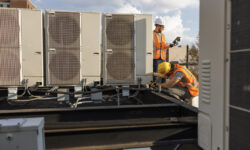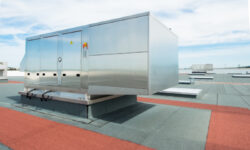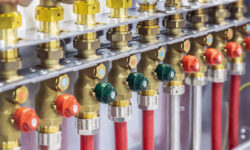Regular HVAC maintenance can help mitigate the impact of supply chain disruptions. HVAC systems are crucial in maintaining comfortable and healthy indoor environments in various settings such as homes, offices, factories, and commercial buildings. Read on to learn how the Severn Groups regular HVAC maintenance services can help you avoid disruptions.
Read more →An HVAC retrofit refers to upgrading or replacing an existing heating, ventilation, and air conditioning system in a building with newer and more efficient technology. Read on to learn more about evaluating your current HVAC system, determining the needs of your building, and how we can help with installing or upgrading your HVAC system components to best meet those needs.
Read more →Regular HVAC maintenance allows you and your occupants to trust that you will be comfortable year-round. Suppose your system wants to create and deliver warm or cool air more consistently and gradually. Regular HVAC maintenance reduces the odds that you’ll come to work one winter’s day to find frigid air blasting through your vents. Read on to learn how investment into regular HVAC maintenance is relatively low cost vs the price of a single repair or loss of production due to stoppage and can greatly increase early issue detection as well as efficient systems operations.
Read more →When deciding on air zone HVAC systems, the Variable Volume & Temperature (VVT) is an HVAC control system with many advantages. The VVT system overview is a cost effective way for building occupants to maintain & control temperature. Read on to learn how a VVT HVAC system is traditionally constructed and the benefits it can have for your business
Read more →Infrastructure is everywhere, and Data Centers are at the heart of housing computer systems and associated components such as telecommunications and storage systems. Understanding ASHRAE (American Society of Heating, Refrigerating, and Air-Conditioning Engineers) temperature and humidity guidelines for built environments is critical to the success of any data center. Read on to learn about ASHRAE temperature and humidity guidelines.
Read more →Businesses pay a lot of attention to their work and cash flows. But what about the flow of water in and out of the business itself? The bigger the building, the more likely you are to face problems with an outdated or overworked plumbing system. But any building manager can benefit from having access to commercial plumbing services. Here are five ways a commercial plumber can help.
Read more →Ideally, renovations will result in an improved space. However, with so many details to consider, some might be too easy to overlook. HVAC design is one of these details. Renovating a building or even just a single office can go wrong if HVAC design is not taken into account.
Read more →Office distractions are terrible for productivity. While open office spaces are great for promoting employee comradery and cubicles still offer some modicum of privacy, they also allow for plenty of noise to disturb important work. HVAC noise might seem trivial, but it’s one of the more distracting and troublesome sounds that can plague a workspace and should therefore be taken seriously. So what can you do to reduce HVAC noise?
Read more →An ounce of prevention is worth a pound of cure. By making and following an HVAC maintenance checklist, you can extend the life of your system. It’s a simple yet essential task that will head off expensive repairs and replacements. Before you perform your fall HVAC maintenance, prepare your list so you don’t miss any critical tasks.
Read more →The United States Department of Energy has a multitude of different responsibilities, but the organization’s primary responsibilities involve managing the nation’s nuclear infrastructure. As ONE of its many responsibilities, the DOE also creates efficiency standards for HVAC equipment. The newest set of standards, 2023 DOE Efficiency Standards, become effective January 1, 2023. These 2023 DOE Efficiency Standards are based on research conducted by independent entities. The DOE and other organizations provide these researchers with funding so that they can explore ways to optimize energy consumption. DOE standards primarily apply to HVAC equipment manufacturers and installers. However, they can also impact your business in several ways. By voluntarily adhering to these standards, you can save money and improve energy efficiency. Additionally, you may be able to access tax credits by designing a system that complies with 2023 standards. Join us as we examine the latest set of 2023 DOE standards and what they mean for your business.
Read more →









